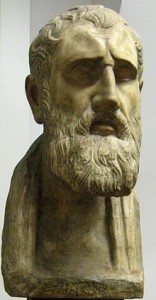 Have you ever thought ‘What if I’m doing it wrong?’ We’ve all had that feeling when learning something new. This is no less true when the new activity is meditation. We may have reached a point where externally everything is polished – we’ve ‘found our seat’ and can meditate comfortably for as long as we would like to – but then another level of difficulty opens up because we are more sensitive to what’s happening ‘inside’.
Have you ever thought ‘What if I’m doing it wrong?’ We’ve all had that feeling when learning something new. This is no less true when the new activity is meditation. We may have reached a point where externally everything is polished – we’ve ‘found our seat’ and can meditate comfortably for as long as we would like to – but then another level of difficulty opens up because we are more sensitive to what’s happening ‘inside’.
If that new practice is one of the more open styles of meditation, such as ‘just sitting’ or recollective awareness meditation, there are not the usual meditation instructions to fall back on. It is much more likely that a novice will be worrying, ‘What if I’m doing it wrong?’ when there is a fundamental lack of specific guidance on what it means to be doing it right. When I think I’m doing it wrong, then I’ve assumed that there are certain desirable results (meditative attainments) that are supposed to come from doing it right. By doing it wrong, I worry that I will be denied these results. Is it at all helpful for me to be concerned about this? Have I completely missed the point? Or maybe there is no point – in which case, why am I even doing this?
As I understand it, in the traditional schools of Buddhist meditation one’s progress along the path is marked by meditative attainment, which is typically a matter that is kept between you and your teacher, someone more accomplished and better integrated than yourself. However, Jason Siff writes (in Thoughts are Not the Enemy, Shambhala 2014, p179), ‘I believe attainments are unnecessary concepts. They can easily derail a well-functioning spiritual path and turn it into a dysfunctional nightmare. … Some attainments may be real. Now, when that is the case, there is no advantage to making it known. Someone who really has succeeded in diminishing the force of her desires and ill will, and has substantially reduced her self-importance and pride, would be content being a nobody’.
People, myself included, first come to meditation with the expectation that their hard work will be rewarded. It’s part of our culture in the Western world, where the Protestant work ethic is alive and well despite increasing secularism. New meditators will also expect their time to be productive – even their leisure time: ‘work hard and play hard’. We can’t help but bring our cultural conditioning to new activities, meditation too, and probably without even consciously thinking about it we believe that doing it right will ensure a more efficient path to being productive. But productive of what?
The recent presence of mindfulness in the media, coming mainly from the growth of mindfulness based stress reduction programmes, means that it would be easy for those running meditation groups to sell meditation to newcomers as simply a method for solving problems – to cure whatever ails you. Stephen Batchelor (in After Buddhism, Yale University Press, 2016) points out that ‘…treating meditation as a technique for solving the problem of human suffering, however, is nothing new. Buddhism itself has frequently lapsed into this way of thinking and, in some schools, uncritically endorses such an approach. … This is no different from a sales pitch for an effective diet: if you follow this regime for X amount of time, it is certain that you will lose X amount of weight.’
The beginning meditator will look to veterans for reassurance that they’re doing it right, and that doing it right does have some positive benefits. We are, like it or not, driven by goals. However, there is the possibility that a well-practiced meditator has completely missed the point. Despite their accomplishments in certain meditative techniques they may have failed to have become a more integrated person, or, more generously, their integration may be radically asymmetrical with their desires well integrated, but their beliefs are poorly integrated as they are still operating under the assumptions of ideological dogma.
What light can recent developments in psychology shed on this topic? Conceptualising meditation in our minds as a task to be done correctly is a very heavily left hemisphere dominated approach: understandable in our current culture, but not a sign of good integration between the narrowly-focussed task-oriented language-producing aspects of our minds and the complementary widely aware integrating nonverbal aspects. Iain McGilchrist’s thesis (in The Master and His Emissary, Yale University Press, 2012) is that our current Western culture is the product of our left hemispheres pretty much going it alone (in his analogy, the Emissary has usurped the Master), and, if there is any hope of saving our sick society, it will involve a reintegration of the left and right hemisphere modes of being in the world, where the task-oriented narrow-focus modes of our left hemispheres are integrated by the wider awareness and more fluid modes of our right hemispheres.
I appreciate this from personal experience as much as anyone. I’ve read enough books, listened to enough podcasts, watched enough videos and conversed with enough people. Which of these authorities am I hoping will be able to reassure me that I’m doing it right? As is often the case, there are about as many different opinions as there are people expressing them, and without some kind of absolute conviction that one of them is The Truth there’s a danger of flipping to the other extreme (of relativism) and assuming that all of these different methods are equally useful to me.
What I’ve found so far in my practice of meditation (which most commonly involves sitting quietly, with the intention to meditate) is that however much I want do it right, in fact I can’t do it wrong. Whatever progress occurs, it is arrived at indirectly, and if I assume I know what my so-called correct technique is aiming to achieve then I’m fundamentally limited by those assumptions. By sitting quietly and treating my thoughts kindly – not cutting them off or drowning them out – the noisy, narrowly focussed left hemisphere has a chance to settle of its own accord, and then the right hemisphere’s openness to new experience can make itself known. It isn’t a battle to subjugate the left hemisphere (that’s the sort of plan-driven technique that the solo left hemisphere would derive) but a space in which the right hemisphere can integrate with the left within its wider awareness.
To conclude, a quote and more questions. In After Buddhism, Stephen Batchelor suggests that ‘…meditation is more usefully compared to the ongoing practice of an art than the development of a technical ability.’ Still, when cultivating an artistic meditative practice, people can also worry about doing it wrong, however cultivating a sensibility is a very different thing to drilling the correct practice of a technique. Is there some way of adapting the reassuring but dangerous phrase ‘you can’t do it wrong’ so that it reflects this view of it being the cultivation of an art rather than the execution of a technique?


